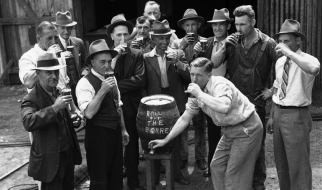If you?re wondering how to get started, here?s the way to go.
 Source: Unsplash
Source: Unsplash
Three years ago, I got into music and realized it was actually possible to learn how production works with no real equipment, no crazy-high-tech software, and no talent (or success) in playing instruments. Personally, I had no idea how far I could go with just an iPad, a free app, and a pair of headphones.
P.S. it?s actually very far.
Stop teaching music this way:
We should forget about teaching kids how to play physical instruments (like the flute or cello). Why aren?t we teaching them how to compose using today?s technology first? If you can learn how to compose, you can understand how ALL elements work in harmony.
By learning one instrument, you limit your creativity.
I used to think production software was overwhelmingly complex and required large amounts of brain power to operate. I remember watching videos of guys working in studios surrounded by lights, giant speakers, colorful sound boards, wires, cups, lighters, headphones, and like 5 different computer screens depicting something like:
 I know what all this means.
I know what all this means.
Given I couldn?t play a single instrument and didn?t know a thing about music theory, creating music seemed vaguely impossible. I kind of just looked at it as a realm of entertainment I missed out on, like ?Oh, I just wasn?t blessed with the ?musically-gifted? trait.? When the pieces finally fell into place and I started understanding production, it felt like debunking a myth or cheating the system. I couldn?t believe how capable I was despite my lack of knowledge and resources.
The One and Only Thing You Need to Make Music
 A bunch of unnecessary stuff. Source: Unsplash
A bunch of unnecessary stuff. Source: Unsplash
See all that? Realistically, you need about 1% of that to create. A digital audio workstation (DAW) is really all you need, which is a software used for recording, editing, and producing music. You can actually download a free DAW to your computer or phone right now and have absolutely everything you need to start on your first track.
It really is as simple as that, yet people don?t make the connection. Nobody wakes up thinking: ?You know, I?d like to learn how all music works today.? It?s just not a tangible thought or idea people have or see as a real opportunity. It takes a certain kind of person to want to create their own sound. Those who want to but don?t either psyche themselves out because they think they need $15,000 worth of equipment/software or they don?t think they?ll make anything good. People should really stop thinking.
What?s the best DAW software?
No questions, beginners should use GarageBand starting out. Why?
- GarageBand is the easiest, most intuitive to learn (it?s made by Apple)
- GarageBand is the most accessible and affordable (it?s pre-installed on every Apple device)
For those two reasons, it makes the most sense to recommend GarageBand to starters. But don?t get confused: GarageBand software is super powerful, completely capable of professional-level music.
When it comes to music production, it?s not so much about what is used, it?s more about the engineer and how well they know their program.
 Simple, fast, and fun. Screenshot of GarageBand on iOS
Simple, fast, and fun. Screenshot of GarageBand on iOS
How to Go 0-to-100 as a Modern Music Creator
Hopefully you realize all you need is a good DAW and a good attitude to get started. Both are totally free and one is probably already installed on your phone. There are really two ways to learn music production:
- Become self-taught through experimentation, research, and lots of trial-and-error
- Get help and guidance from an experienced musician/mentor
?Is it possible to teach myself??
Absolutely. People do it all the time, in fact, it?s how I learned. But make no mistake, self-taught is difficult and you?re very likely to fail.
Despite plenty of tutorials floating around online, it?s still a lot of work to sift through it all and learn from various sources. There?s a lot of crap out there and it?s highly unlikely you?ll consistently find golden nuggets of content pertaining to exactly what you?re trying to do in your music.
Self-taught is a huge challenge because you don?t know what you don?t know.
You have to figure it out on your own? then learn on your own, too. Some can do it, but most can?t. It?s easy to fizzle out or give up because it?s such a steep feat. Producing can get tiresome, even frustrating when you don?t know what to do next or can?t take a song where you want to. The worst is when you can?t figure out something that seems simple. (Good luck, you?re on your own pal!)
I really don?t recommend learning by yourself unless you have tons of time on your hands, you?re highly motivated to learn, and you?re willing to be very confused about pretty much everything for a while.
The Easiest Way to Cultivate Talent and Experience in Music
I took the long, hard self-taught route. I first started using GarageBand in summer of 2016, so it took over 2 years to really understand and get comfortable with all the aspects of production ? and this is putting in about an hour a day. That?s what it takes when you start with nothing and work from ground zero. Looking back, I wouldn?t have taken this route because there?s much faster, more efficient alternatives.
The best way to learn music is to find an online mentor with experience who can lead you in the right direction.
Guided instruction backed by experience is so valuable because it teaches you what?s relevant and applicable. Basically, you won?t waste your time learning stupid stuff that?s inaccurate and useless. Also, there are several concepts you should know in the beginning that will expedite your learning process and help you understand how beats work from a technical standpoint.
Even a little bit of guidance can set you on a quicker, more linear path to success.
There are dozens of courses and instructional series online; you can complete most in about a week. A personable online course for GarageBand will bring you up to speed, create a sound foundation to build on, and provide a significant shortcut for anyone looking to jump straight into music production.


